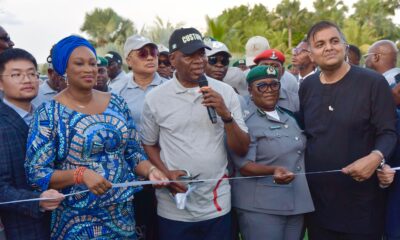Business
Revenue, Trade Facilitation, National Security

Onyeka’s Story of Strategic Convergence
BY EGUONO ODJEGBA
At Nigeria’s second-largest seaport, Tin Can Island, a quiet but powerful transformation has been underway. Comptroller Frank Onyeka, the Area Controller of the Nigeria Customs Service (NCS), is leading a strategic overhaul that fuses revenue generation, trade facilitation, and national security into a unified operational doctrine.
His leadership, marked by bold enforcement, technological innovation, and stakeholder engagement, is reshaping the customs narrative and setting new benchmarks for performance.
Enforcement as a Pillar of National Security
Onyeka’s recent interception of narcotics worth ₦5.3 billion, concealed in containers that originated from Canada, underscores the Command’s vigilance against transnational crime. These seizures, involving Colorado Indica, Hashish Oil, Cannabis Indica, and Crystal Methamphetamine, were not just tactical wins but strategic affirmations of Nigeria Customs Service’s resolve to protect the nation’s borders.
The handover of the seized substances to the NDLEA and the commendation from Commander Daniel Onyishi reflect a robust inter-agency synergy. A proud and unfazed gentleman officer, Onyeka’s message from Day-1 was: criminal syndicates will find no safe harbor at the Tin Can Island Port.
Revenue Growth Anchored in Compliance
Under his watch, the Command’s revenue figures has been remarkable with a steady upwards surge — first quarter through the second and third quarter, respectively. This upward trajectory is the result of tightened internal controls, strategic consolidation of enforcement efforts, and the elimination of leakages that once plagued the port. It is instructive that the operational and administrative kinetics have continued to maintain a noticeable and logical interplay.
B’Odogwu: The Engine of Reform
Central to Onyeka’s modernization drive is the B’Odogwu Clearance System—a homegrown digital platform that automates customs processes with impartial precision. Since it’s pre-launch, Onyeka has championed its adoption, urging stakeholders to embrace honest declarations and prepare for full implementation.
The platform’s impartiality has helped dismantle the regime of multiple alerts—a long-standing nightmare for importers and freight forwarders. By reinforcing the one-stop-shop model, the Command has reduced operational downtime, improved turnaround time, and fostered a more predictable trade environment.
Stakeholder Engagement and Civic Responsibility

It bears repeating that Onyeka’s leadership is deeply rooted in consultation. His regular meetings with freight forwarders, terminal operators, and bonded warehouse owners have fostered civic responsibility and national values. He consistently preaches compliance, emphasizing that seamless operations depend on honest declarations and mutual trust.
His administration’s openness has encouraged feedback, reduced friction, and aligned stakeholders with emerging federal policies. The result is a more trade-friendly ecosystem that discourages criminal tendencies and promotes national growth through best practices.
Interpreting the Customs Act for Impact
With the enactment of the Nigeria Customs Service Act 2023, Onyeka has taken a proactive stance in interpreting and enforcing its provisions. Officers under his command have been sensitized on revised penalty regimes and valuation protocols, ensuring fair and predictable procedures.
Importers and agents now operate in an environment of legal clarity, reduced discretionary bottlenecks, and heightened compliance—turning potential confusion into operational confidence.
Trade Facilitation: Efficiency as a Strategic Weapon
In a port once notorious for congestion and delays, Onyeka’s trade facilitation strategy is making waves. This includes prioritized areas such as the streamlining of cargo clearance through faster document processing and risk-based inspections, reduced dwell time by promoting transire operations to bonded terminals, and enforcing timelines for cargo release.
It also includes improved port efficiency via inter-agency coordination and the deployment of non-intrusive inspection technologies. These efforts have not only boosted revenue collection but also enhanced Nigeria’s standing in global trade indices.
Innovation Beyond Technology
Innovation under Onyeka is not just about platforms—it’s more about mindset. He has encouraged the use of data analytics for cargo profiling, promoted digital literacy among officers, and supported e-customs tools that reduce human interference and corruption.
His strategic alignment with the Comptroller General of Customs, Adewale Adeniyi’s policy thrusts of Consultation, Consolidation, and Innovation reflects a leadership style that is both visionary and grounded.
Conclusion: A Strategic Leader in Motion
There is no gainsaying that Onyeka’s almost one year stewardship so far has been more than administrative—it’s been phenomenal and transformational. By aligning with national customs reforms and executing them with tactical precision, he is proving that strategic oversight is not just about policy but about performance.
As Nigeria deepens its customs modernization drive, leaders like Onyeka are setting the pace, one pillar at a time.


































